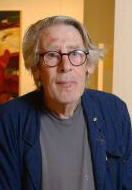
Click an Image below to Enlarge
 Peter Powditch was born
in Sydney 1942 and found early success as an artist. First showing in a
Paddington gallery in 1966, he enjoyed immediate notoriety with his bikini-clad
subjects that were a celebration of Australian beach culture. Powditch favoured
a “Pop Art” style that was reminiscent of American artists Tom Weselmann and
Alex Katz. His beach paintings became as
iconic to the Sydney art scene of the late 1960's and early 1970's as were the
harbourside paintings of Brett Whiteley. Powditch’s most famous works, known
as the Sun Torso series, were
begun in 1970 when he was 28. By 1972, he had become a household name.
Peter Powditch was born
in Sydney 1942 and found early success as an artist. First showing in a
Paddington gallery in 1966, he enjoyed immediate notoriety with his bikini-clad
subjects that were a celebration of Australian beach culture. Powditch favoured
a “Pop Art” style that was reminiscent of American artists Tom Weselmann and
Alex Katz. His beach paintings became as
iconic to the Sydney art scene of the late 1960's and early 1970's as were the
harbourside paintings of Brett Whiteley. Powditch’s most famous works, known
as the Sun Torso series, were
begun in 1970 when he was 28. By 1972, he had become a household name.
"To be honest, in 1972 I was probably the most known artist in Sydney,” he said of that time.
Powditch started his painting studies at East Sydney Technical School of Art and Design but he only stayed for one year as he found the course, as he described it, "amateurish”. He did, however, continue to study sculpture under Lyndon Dadswell as well as going on to painting instruction at John Olsen’s Bakery Art School.
Powditch found Olsen to be an inspiring teacher: "John explained how to see. He talked about going for a walk on a hill and you stub your toe and there is ants coming out, there is a stick and a rock, and you can paint that as much as the hills". Other artists to mentor Powditch included Fred Williams, John Passmore, and John Brack.
But painting or making art was never easy for Powditch. Like the hugely successful American artist, Mark Rothko, he was beset by anxiety, doubt and indecision. He also reportedly found painting to be physically painful and debilitating.
"I am haptic; I feel it in my body. I was asthmatic before I started smoking. I would use a sable brush and paint things really precisely and tight, and holding my breath and not breathing. It was just agony.” Powditch went on to describe himself as having "to find a way to work that was more with my body and my arms. Cutting and sawing and more sculptural.”
Of Powditch's approach, Sydney Morning Herald art critic John McDonald observed: "He will spend three hours thinking about whether he should move an ice-block stick one inch to the left or one inch to the right and will sit up all night in the studio cogitating.”
Powditch himself said he thought his art was killing him. “I felt it was too hard for me. I would paint over everything or burn them. I don't think it was self-destructive; I was just trying to give up. And yet I would start something the next day."
Powditch's stellar career has seen him participate in many major exhibitions including Australian Art Today which toured South East Asia (1970), Australian Prints at the Victoria and Albert Museum London (1972), 1st Biennale of Sydney (1973), and Recent Australian Art at the AGNSW (1973). Amongst the many awards he has won (which include nine between 1972-74 alone), Powditch was awarded the Sir John Sulman Prize in Sydney in 1972.
In 1973, he was the recipient of an Australian Council Grant to live in New York for one year. "I felt more an artist doing nothing there than I did in Sydney working my butt off. There was plenty of things to look at."
The accolades continued. In 1981, Peter Powditch was appointed a Member of the Order of Australia for his services to art.
As well as being a major Australian artist, Powditch has also made a significant contribution as an art educator. He has spent much of his working life teaching art as this is where he thought he could make a difference. "There is always criticism that if you teach, you are not a real artist, but I just loved it.”
Today, Peter Powditch remains an artist whose images are familiar to generations whether interested in the visual arts or not. His place is secure - alongside other East Sydney Technical College luminaries like Godfrey Miller and John Passmore - as an iconic Sydney master whose works will forever have a place in the lexicon of Australian art.
Powditch is represented in major collections in Australia including international Air Terminal, Mascot – Mural; Art Gallery of NSW; Western Australian Art Gallery; Art Gallery of South Australia; Australian National Gallery Canberra; National Gallery of Victoria; Horsham Art Gallery; Shepparton Art Gallery; Gold Coast City; Newcastle City Art Gallery; Tasmanian Museum and Art Gallery; Mildura Arts Centre; Geelong Arts Centre; Ballarat Fine Art Gallery; University of Queensland; University of Western Australia; Phillip Morris Collection; LaTrobe Valley Arts Centre; Art Bank; Woollongong Art Gallery; Parliament House Collection, Canberra; and Western Mining Collection.
All quoted references from The Saturday Paper article by Susan Chenery, “Late life drawing of artist Peter Powditch” 19 September 2015.
Copyright © 2008 Art Nomad. All rights reserved. Click here to view copyright statement